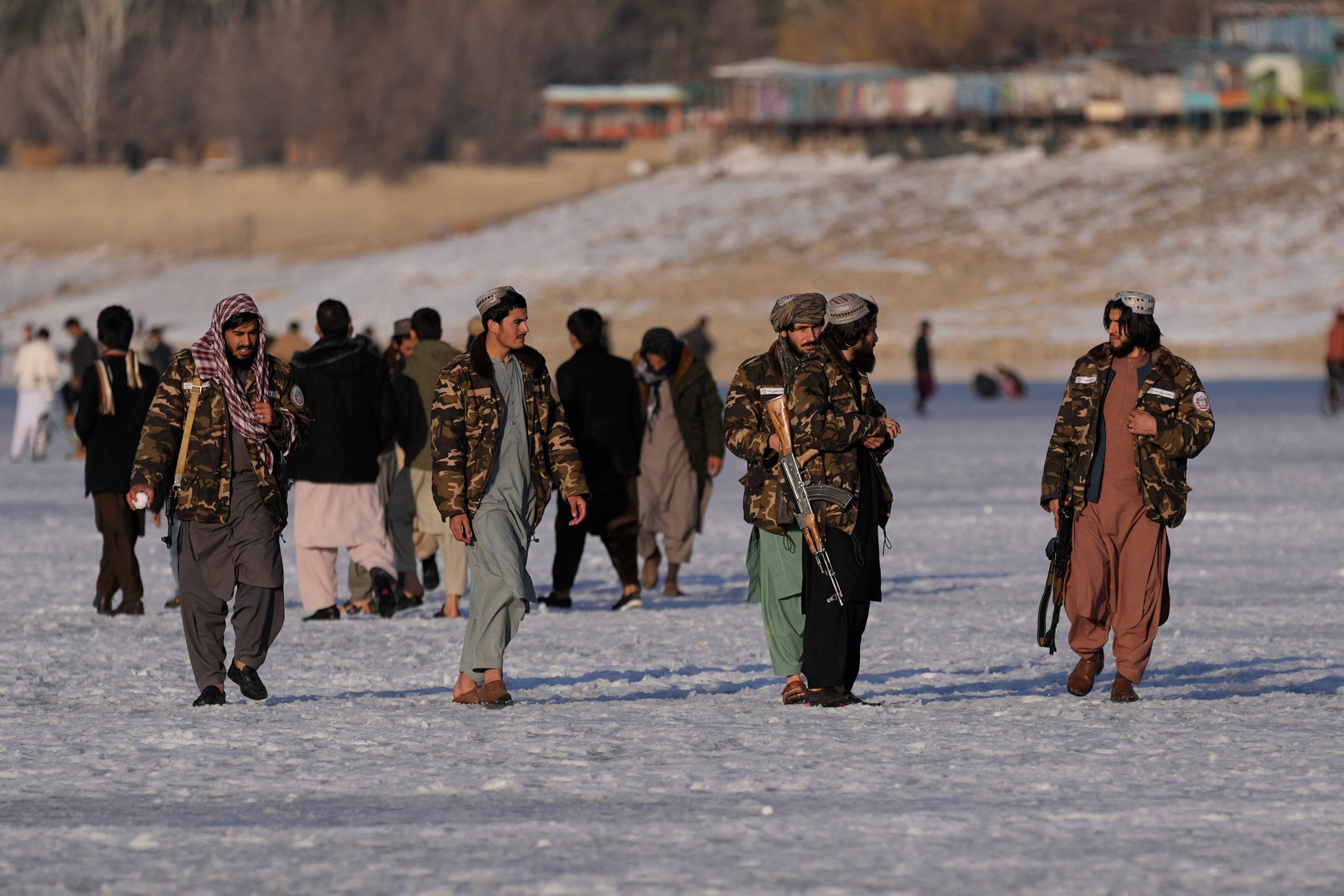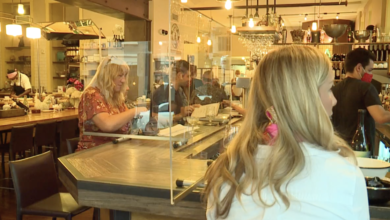
The killing of George Floyd engendered feelings of rage, powerlessness and determination in millions of Americans. It also generated some powerful art.
From street murals to personal poetry, artists embraced a range of disciplines to both process the emotional event, as well as feel part of a community sharing the same experience amid a deadly global pandemic and mass quarantines.
Artists from diverse backgrounds responded to a USA TODAY call for submissions inspired by the May 25, 2020, murder of Floyd at the hands of former Minneapolis police officer and convicted murderer Derek Chauvin.
Among them was Holly Anne Mitchell of Indianapolis, whose jewelry is made entirely from newspaper clippings. When she heard about Floyd’s death, Mitchell was overcome with “a feeling of powerlessness.” Then she sat down at her workbench.


Holly Anne Mitchell makes and sells jewelry fashioned from newspaper clippings. After George Floyd's murder, she made an elaborate "I Can't Breathe" necklace featuring his likeness and headlines from the event. She is pictured here making that necklace.
Holly Anne Mitchell makes and sells jewelry fashioned from newspaper clippings. After George Floyd's murder, she made an elaborate "I Can't Breathe" necklace featuring his likeness and headlines from the event. She is pictured here making that necklace.
COURTESY OF HOLLY ANNE MITCHELL
The result is an elaborate necklace that draws inspiration from both African art and her Catholic faith. The central element is a photo of Floyd, surrounded by a range of newspaper headlines.
“Mr. Floyd’s death symbolizes the burden, pain and fear African Americans carry every day,” Mitchell wrote in her submission. “He represents my father, my male cousins, my uncles and many other loved ones.”
In an interview, Mitchell, 50, said creating the “I Can’t Breathe” necklace was a way to find “not quite a healing feeling, but at least a comfort in being able to express myself through art. I knew I had to do something, to say something.”
Mitchell’s response is part of a longstanding historical tradition that often finds artists serving as conduits for a general population’s feelings of both anger and joy, said Casarae Lavada Abdul-Ghani, assistant professor of African Studies at Syracuse University in upstate New York, who often lectures on the intersection of the arts and protest movements.
Boots On The Ground: The Black community in Minneapolis finds peace after George Floyd
The Black community in Minneapolis, connected through trauma, is activated by the Derek Chauvin verdict in the ongoing battle for justice.
Jarrad Henderson and Harrison Hill, USA TODAY
“This kind of art is personal and comes out of a grievance about matters left unaddressed by society,” she said. “What you’re seeing with art in the wake of this incident is an effort to vocalize empathy and concerns about humanity.”
Abdul-Ghani sees a direct link to the arts movement that grew out of the civil rights protests of the 1960s, when writers such as Sonia Sanchez and Amiri Baraka leveraged their talent to fuel the Black Arts Movement as it helped press for societal change.
“There are definitely parallels between then and now in the way that today’s artists are using their skills in order to discuss the questions people are wrestling with, from police brutality to simply what it means to be American,” she said.
For Rodney Wilkinson, putting pen to paper helped him focus his feelings about the Floyd killing, which ranged from anger to a desire to avoid stereotyping. He said he deliberately called out Chauvin by name in his poem titled “In Memory of George Floyd,” to make the point that “not all police are like that.”
“I love America and I love my town” of Rochester, New York, said Wilkinson, 67, a retired Black educator who is an ordained minister and now works as a custodian.
"If someone does something wrong, I’m going to challenge that,” he said.
One stanza of his poem captures that indignance:
Mr. Chauvin was a man with a silent rage – hidden by a badge on a center stage
So what if Mr. Floyd had been drinking – What was causing Mr. Chauvin’s stinking thinking?
He’s down and handcuffed, what the heck. Nine minutes ain’t long for a knee on the neck
There was no excuse – for that extreme and cruel abuse.
In the heat of last summer’s Black Lives Matter protests, grade school teacher Brian Downie 34, of Santa Barbara, California, was moved to pull out his 20-by-17-inch sketch pad and colored pencils and let his emotions spill onto the page.
The result was an encompassing portrait of both despair and hope that seems to foreshadow the Jan. 6 attack on the U.S. Capitol by pro-Trump administration supporters that resulted in five deaths and millions of dollars in damages.

Called “Molotov Cocktail Party at the White House,” the drawing features both historical and current images, such as the famous raised fist protests by Black runners at the 1968 Mexico City Olympics and riot police confronting protesters. There is also a White House with flames emerging from its windows.
One detail spotlights a protester and a police officer standing side by side, both with their hands up — a gesture often used by protesters as chant “Stop, don’t shoot.” Downie said the drawing was inspired by a local protest he attended during which a police officer took a knee alongside the group to honor Floyd.
“I tried to show all sides of things, including that great moment which still gives me chills, but also police in riot gear because I had friends in Seattle who protested peacefully but who were teargassed by the cops,” he said.
The artwork provided a cathartic release, he said.
“I can spend a month on a drawing, but this came out in two days,” he said. “I had all this emotion inside, sometimes I was angry, other times I was hopeful.”
Eric Lee is used to working with smiling happy people in his job as a wedding photographer in Washington, D.C. But ever since the killing of Floyd, the Korean American artist has become increasingly dedicated to chronicling in photos the birth and growth of the Black Lives Matter movement.

Lee knew that when the pandemic eased he would have to make a pilgrimage to the site where Floyd lost his life. During one visit, he photographed the Cup Foods storefront Floyd visited before he was killed and a makeshift memorial to Black Americans killed by police.
Once in Minneapolis, he made sure to approach others at the scene to be able to hear their sentiments and reflections on Floyd's murder.
“My goal with my art is for people to see these images and feel compelled to feel solidarity with each other, no matter what their race, and move to fix this systemic problem,” said Lee, 42. “We all should have equal rights for fair treatment. We are all human beings.”
Full poem by Rodney Wilkinson: "In Memory of George Floyd"
I like to write and love to rhyme - of fun and humor all the time.
A year ago I wrote for you - Chisel, Bisel and Jammin Da Boo.
In the past I've been delirious - but recently I've been more serious
And now for months in my spare time - Old Testament Books called 'The Bible in Rhyme'
But when this tragedy hit this Nation - I wanted to do my part
And now to help with my frustration - has come a poem from my heart
Mister George Floyd, whom one cop hated - to all who hurt, it's dedicated
His motive unknown and still a mystery - on a very dark day that's down in history
Death often comes in the dark of the night - This was done mid-day in the broad day light
Clear and blatant - in everyone's sight. Shame on you! What DID you do?
He knew his job is protect and serve - that was NOT what was observed
And Mr. Floyd GOT what he didn't deserve
Mr. Chauvin was a man with a silent rage – hidden by a badge on a center stage
So what if Mr. Floyd had been drinking – What was causing Mr. Chauvin’s stinking thinking?
He’s down and handcuffed, what the heck. Nine minutes ain’t long for a knee on the neck
There was no excuse – for that extreme and cruel abuse
He showed remarkable dedication - for the prolonged nature of asphyxiation
Inflicting gratuitous pain, and psychological distress - on his victim AND bystanders
and children who witnessed his death
They watched in terror on this most tragic day - as this murder and nightmare had its way
When some stepped off the sidewalk, a cop on the beat
Said quickly and harshly "Get out of the street."
"Don't be alarmed and don't be a thug - this is what happens when you use drugs."
Mr. Chauvin still is looking around. Mr. Floyd's neck still pinned to the ground
Time slowed down, then a lift stood still - Mr. Chauvin's big concern, was a twenty dollar bill
And those words which were last - forever shall echo in the future and past
"I can't breathe. I can't breathe - twenty seven times - I can't breathe."
"Help me Mama. Help me please - I'm sorry sir. I can't breathe."
We all shall have our final hour - and then shall meet our higher power
No more fears and no more tears - no more darkness no more storms
His Word He's faithful to perform
Full time day and never night - He'll turn your darkness into light
Because He has all power and might - and we help to do what's right.
Published
Updated
Source link








